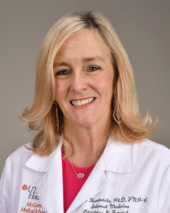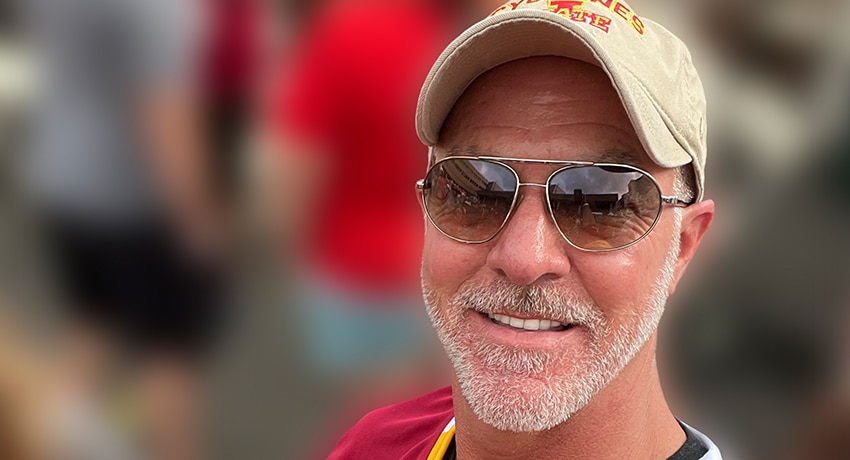HIV is a virus that targets the body’s immune system, and the late stage of this infection becomes AIDS. Thanks to advanced medicine, however, people with HIV can live functional and healthy lives. Jay, 49, is living proof.
In 1998, Jay was diagnosed with AIDS. He was just 25 years old.
“I was living in Dallas, and it was just a year after I completed graduate school. I had severe nausea that wouldn’t go away, and I started feeling flu-ish. That’s when I went to see the doctor,” he said. “I was given an HIV test, and it showed my viral load was off-the-charts high. My T-cells were very low double digits, to the point that I was given the diagnosis of AIDS.”
Jay was immediately given medications to control the condition — and they worked.
“I live a completely normal life. I go to work and the gym each day. I have a regular social life. The only thing different is the medication I take,” Jay said. “The medication regimen is much easier now, though. Initially, I had to take three or four different medications a day at different times of the day. They worked, but there were many side effects. Now, all the medications are in a single pill, which is not only simple but extremely effective.”

Robin L. Hardwicke, PhD, internal medicine specialist with UT Physicians and professor of internal medicine with McGovern Medical School at UTHealth Houston, has treated Jay since 2008.
“I used to only take care of HIV-positive women. Jay was one of my first patients when I started taking care of men,” Hardwicke said. “Jay’s an outstanding patient, and he’s very well educated. I’ve mainly just helped him make good choices to not worsen his condition. Jay does what he needs to do. He takes care of himself.”
In addition to regularly taking his medication, Jay tries to maintain a healthy lifestyle.
“Because I have a weakened immune system, I am more aware of my choices and possible consequences,” Jay said. “Eating healthier, sleeping better, and exercising more can only help me, so I try to keep them up. We should all live this way, but I probably try a little harder.”
For HIV Awareness Month, Jay offers two simple pieces of advice: Wear a condom. Get tested.
“A lot of people now take PrEP (pre-exposure prophylaxis) medication to prevent HIV,” Jay said. “This wasn’t available back then. While PrEP is a good thing, you still need to practice safe sex.”
A pill cannot replace a condom, Jay reminds.
“It’s not just HIV. There are many other STDs (sexually transmitted diseases) that people forget about. PrEP won’t prevent you from getting chlamydia, gonorrhea, or syphilis, for example,” he said.
It is also important for sexually active people who do not have a steady and trusted partner to receive regular HIV tests.
“Some people don’t want to get tested because they don’t want to deal with the reality or stigma of HIV if they test positive, but it’s better to face it so you can receive the help you need as quickly as you can,” Jay said.
For anyone who does contract HIV, whether it is through sexual intercourse, blood exchange, or other means, there is hope.
“It’s a scary thing to go through, but it isn’t a death sentence. We are living the same healthy lives as our negative counterparts with medication,” Jay said. “Also, if you take HIV medicine and it remains at an undetectable viral load, you can’t transmit it to your partner.”
The doctor confirmed this information.
“Over the last 40 years, we’ve made an unbelievable impact on HIV, more so than any other disease,” Hardwicke said.
Though HIV can be managed and controlled, the stigma is much harder to remedy.
“I think it’s still seen as a gay disease, but it is just as prevalent in the straight community,” Jay said. “Or people think an HIV-positive person is a ‘dirty’ or careless person. It’s hard for people to move past the stereotypes.”
In truth, HIV can affect people of all ages, ethnicities, and social status. It only takes a single encounter with an infected person, Jay explained.
“It’s not just the stereotypical drug addict on the corner who has it, it’s also the CEO. It’s not just the single, gay 22-year-old at the club who runs the risk, it’s also the recently divorced 55-year-old mother at the bake sale who is just starting to date again,” Jay said. “In general, everybody needs to know all the available options to protect themselves against HIV. It’s everyone’s disease.”
Success stories like Jay’s are not unusual, but they are rarely told.
“There are hundreds of thousands of HIV success stories out there, but hardly anyone wants to tell it because it will expose them and stigmatize them,” Hardwicke said. “We need to make it where it’s OK for people to say, ‘I’m living with HIV.’”
As for Jay, he remains optimistic.
“Having that discussion is where the education starts and the stigma ends,” he said.


